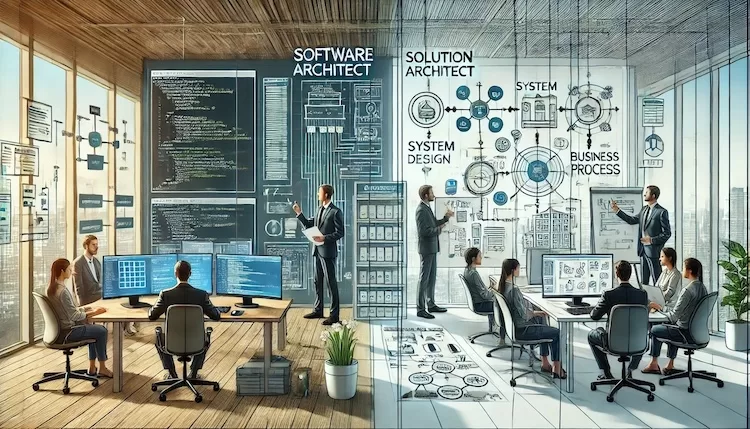Recently, I was asked what I wanted to develop and what I chose between Software Architect and Solution Architect. Both roles involve designing, developing, and implementing a technical solution that meets business requirements. However, there are key differences between them, aren’t there? I decided to explore in detail what they have in common while also testing my understanding of each role’s responsibilities.
Software Architect
Also known as Application Architect or Technical Architect, as sometimes referred to on some resources. At the same time, other resources separate these roles. The boundary here is quite blurred.
A Software Architect is responsible for the entire system’s design and development.
Regarding specific responsibilities or activities for a Software Architect, these include:
- Describing and creating the architecture of a specific system.
- Designing the entire system according to business and functional requirements and developing it.
- Reviewing cost analysis and development schedules and ensuring they meet the project’s budget and timeframes.
- Creating presentations on the system’s work.
- Planning integrations with certain technologies and the development process.
- Providing technical assistance and support to developers and other stakeholders.
- Checking software quality and ensuring it meets quality, security, scalability, and modification requirements.
- Overseeing the development process.
- Collaborating with the QA team and performing final software quality checks before system deployment.
- Communicating with the development team throughout the entire project development cycle.
In summary, a Software Architect ensures the system meets business needs and is technically well-implemented. A Software Architect must understand development principles and practices, think strategically, and solve complex problems. In many companies, this role is defined as 50% engineering and 50% management. Therefore, deep knowledge of programming languages (Java, Python, C#, etc.) used in the project is mandatory.
Skills of a Good Software Architect
What should a Software Architect have to be successful?
- Bachelor’s degree in computer science, information technology, or any related technical field.
- Additional certifications in frameworks and software architecture are a great advantage.
- Extensive expertise and experience with software architecture styles and design patterns.
- In-depth knowledge of related programming languages required by the project (e.g., Java, Python, Ruby, C++).
- Excellent project management skills.
- Great interpersonal and written communication skills.
- Strong team management skills.
- Knowledge of development methodologies.
- Excellent analytical and problem-solving skills.
These general requirements can set off one’s journey to become a successful Software Architect.
Solution Architect
The primary responsibility of a Solution Architect is to help clients use an already-built system and collaborate with them to solve business problems through software.
This role focuses on designing the system and implementing it.
Key responsibilities of a Solution Architect:
- Evaluating current business technologies and finding innovative solutions to improve them.
- Creating documentation with requirements for solutions necessary for the proposed technical improvements.
- Collaborating with technical teams to ensure all parts are functional (e.g., hardware, software, network).
- Monitoring proposed solutions and arising issues (e.g., risks, time constraints, resources).
- Acting as a bridge between the client and the technical team to develop solutions and achieve desired results.
A Solution Architect is a professional who designs and implements solutions that meet business needs while being technically feasible and cost-effective. A Solution Architect typically has a deep understanding of both business and the technological landscape. They can bridge business requirements with technical specifications, manage risks, and identify potential problems.
Skills of a Good Solution Architect
A Solution Architect is responsible for updating a company’s technologies and systems. Therefore, a professional should have the following necessary skills:
- Master’s degree in business administration, especially with information-systems-related courses.
- In-depth understanding of tech systems, innovative processes, and system security.
- Knowledge of business analysis and best practices.
- Extensive knowledge about operating systems and developing cloud infrastructure and IT systems.
- Creativity.
- High analytical and problem-solving skills.
- Organizational skills and attention to detail.
Summary
Similarities
Despite their differences, Software Architects and Solution Architects share some similarities. Both roles require strong problem-solving skills, the ability to think strategically, and the ability to communicate effectively with technical and non-technical stakeholders. Both roles also require a deep understanding of business and the technology landscape.
Differences
The main difference between Software Architects and Solution Architects is their focus. Software Architects focus on the design and development of software systems, while Solution Architects focus on the design and implementation of solutions that meet business needs.
How to Choose a Role?
If you are more interested in the technical aspects of software development, then a Software Architect role may be suitable for you. If you are more interested in the business aspects of technology, then a Solution Architect role may be suitable for you.
Useful Resources
In studying this topic, I read many articles. The most interesting and useful, in my opinion, were these:
- Software Architect vs. Solutions Architect – a detailed comparison of these two roles.
- Solution Architect – a description of the Solution Architect role.
- Technical Architect – a description of the Software (Technical) Architect role.
- Enterprise Architect vs. Solution Architect vs. Technical Architect: What’s the difference? – a comparison of the roles and a poster describing their duties and focus areas.
